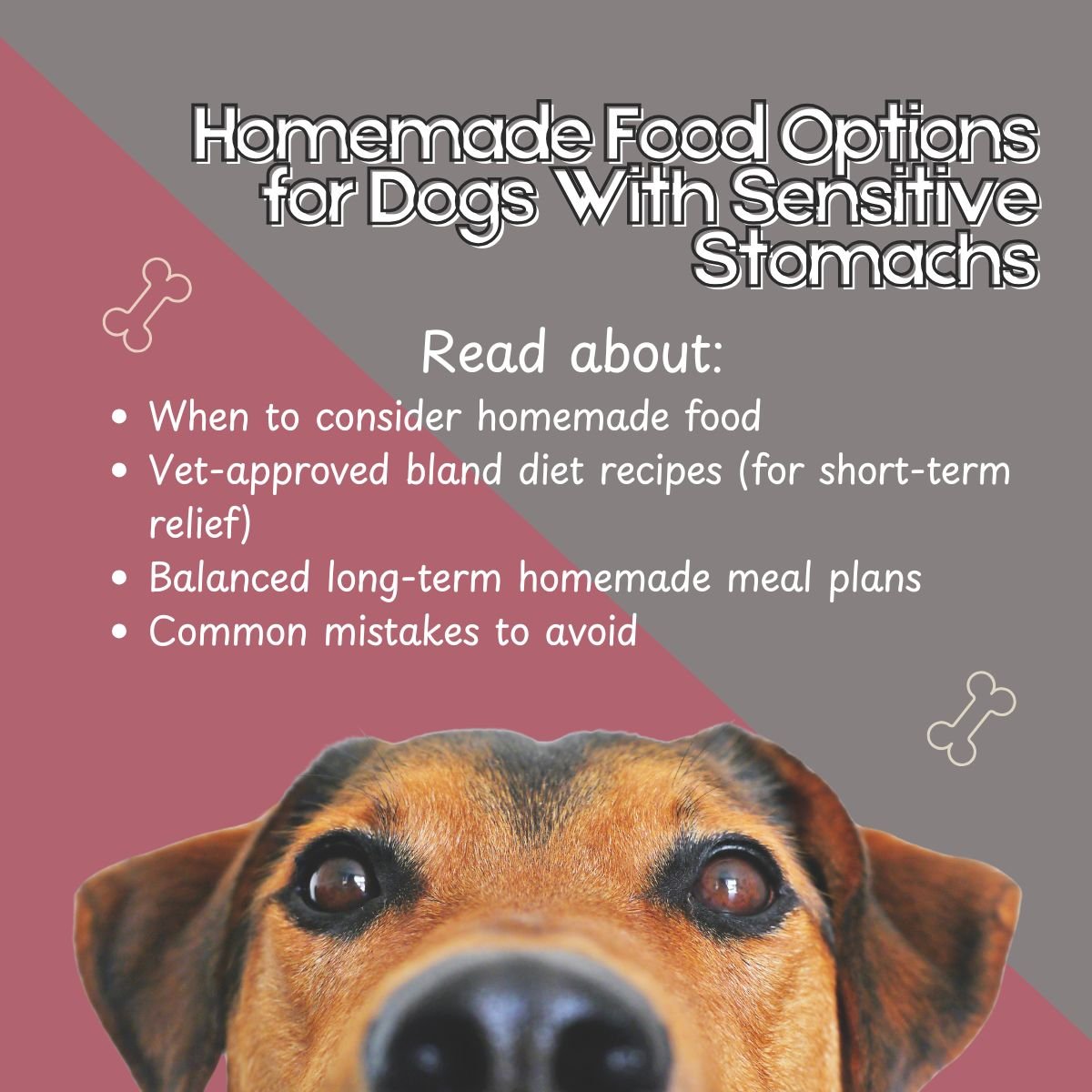Have you ever watched your beloved furry friend struggle with tummy troubles? Digestive issues like vomiting, diarrhea, or loss of appetite can be heartbreaking for pet parents. If your dog has a sensitive stomach, choosing the right food for dogs with sensitive stomachs is crucial to their comfort and health.
A vet-approved diet tailored to digestive health can transform your pup’s well-being, reducing symptoms and boosting their energy. But with so many options, how do you pick the best one? This guide covers top-rated dog foods for sensitive stomachs, key ingredients to look for, and tips for transitioning your dog safely.
Whether your pup needs a limited-ingredient diet, hypoallergenic formula, or probiotic-rich food, we’ve got you covered. Let’s dive into the best food for dogs with sensitive stomachs to help your furry friend thrive!
Disclosure: PetzVibes.com is a free online platform that provides valuable content and comparison services. To keep this resource free, we may earn advertising compensation or affiliate marketing commissions from the partners featured in this blog.
🐾 Signs Your Dog Has a Sensitive Stomach
Is your pup acting off after meals? Dogs with sensitive stomachs often show clear (and sometimes messy) signs of discomfort. Recognizing these symptoms early helps you choose the right food for dogs with sensitive stomachs before minor issues become bigger problems.
Common Symptoms to Watch For
-
Frequent Vomiting 🤢
Occasional vomiting can happen, but recurring episodes—especially after eating—may signal digestive distress. -
Diarrhea or Loose Stools 💩
Unpredictable potty breaks or watery stools are classic red flags for food sensitivities. -
Excessive Gas 💨
While some gas is regular, constant foul-smelling flatulence could mean your dog’s struggling to digest their food. -
Loss of Appetite 🥄
A sudden disinterest in meals or picky eating might indicate stomach irritation. -
Lethargy or Low Energy 🛋️
If your usually playful pup seems sluggish after eating, their digestive health may need attention. -
Grumpy Tummy Noises 🔊
Loud gurgling (borborygmi) is a telltale sign of gut discomfort. -
Licking Lips or Gulping 👅
These subtle behaviors often precede nausea or acid reflux.
When to Worry
While mild symptoms may resolve with a vet-approved diet, consult your vet if you notice:
-
Blood in vomit/stool
-
Weight loss
-
Symptoms lasting >24 hours
💡 Pro Tip: Keeping a symptom journal to track triggers helps your vet diagnose faster!
🐶 Causes of Sensitive Stomachs in Dogs
A dog with a sensitive stomach can have symptoms ranging from mild discomfort to severe digestive issues. But what’s causing the problem? Understanding the root causes helps you pick the best food for dogs with sensitive stomachs and prevent future flare-ups.
Top Causes of Digestive Upset in Dogs
-
Food Allergies & Intolerances 🍗🚫
Like humans, dogs can develop allergies to common ingredients like chicken, beef, wheat, or soy. An allergic reaction often leads to vomiting, diarrhea, or itchy skin. Switching to a limited-ingredient diet or hypoallergenic dog food may help. -
Low-Quality or Sudden Diet Changes 🥘🔄
Cheap fillers, artificial additives, or frequent food switches can wreck your pup’s gut. Always gradually transition to new dog food for sensitive stomachs (over 7–10 days). -
Infections & Illnesses 🤒🦠
Bacterial infections (like Salmonella), parasites (Giardia, worms), or conditions like pancreatitis can cause severe stomach upset. If symptoms persist, a vet visit is a must. -
Stress & Anxiety 😟🐾
Believe it or not, dogs can get stress-induced tummy troubles! Significant changes (moving, new pets, loud noises) may trigger digestive issues. Calming supplements or routine adjustments can help. -
Eating Non-Food Items 🧦🗑️
Dogs that scarf down grass, socks, or trash often have irritated stomachs. Watch your dog’s scavenging habits! -
Age & Breed Predisposition 🐕🦺👵
Some breeds (like German Shepherds and Bulldogs) are more prone to sensitive stomachs, and seniors often develop weaker digestion.
How to Identify the Cause?
-
Try an elimination diet (with vet guidance).
-
Rule out parasites with a fecal test.
-
Monitor stress triggers and mealtime behavior.
💡 Quick Tip: If your dog’s stomach issues are frequent, a vet-approved sensitive stomach food with probiotics and prebiotics can support gut health long-term.
🥘 Key Ingredients to Look For in Dog Food for Sensitive Stomachs
Choosing the right food for dogs with sensitive stomachs can feel overwhelming, but focusing on gut-friendly ingredients makes all the difference! Here’s what to prioritize when picking a vet-approved sensitive stomach formula:
1. Easily Digestible Proteins �
Dogs with tummy troubles need high-quality, low-fat proteins that won’t irritate their gut. Look for:
-
Chicken (deboned, skinless)
-
Turkey
-
Salmon (rich in omega-3s)
-
Lamb (great for dogs with poultry allergies)
-
Hydrolyzed protein (pre-broken down for easier digestion)
🚫 Avoid: Tough-to-digest proteins like beef or pork if your pup has a history of sensitivities.
2. Prebiotics & Probiotics 🦠
A healthy gut microbiome is key! These ingredients help balance digestion and reduce flare-ups:
-
Prebiotics (chicory root, pumpkin, sweet potato) – feed good bacteria
-
Probiotics (live active cultures) – boost gut health
-
Fermented fiber (like beet pulp in moderation)
3. Omega-3 Fatty Acids (EPA & DHA) 🐟
These reduce gut inflammation and support skin + coat health:
-
Fish oil (salmon, sardines)
-
Flaxseed (plant-based alternative)
4. Gentle Carbohydrates �
Some dogs struggle with grains, while others need them for fiber. Opt for:
-
White rice (easy to digest)
-
Oatmeal (soothing for upset stomachs)
-
Sweet potatoes (packed with fiber & vitamins)
🚫 Avoid: Corn, wheat, and soy—common irritants for sensitive pups.
5. Added Digestive Enzymes 🧪
These help break down food for better nutrient absorption:
-
Papain (from papaya)
-
Bromelain (from pineapple)
💡 Pro Tip: Check the label for AAFCO approval to ensure balanced nutrition.
🚫 Ingredients to Avoid in Dog Food for Sensitive Stomachs
Picking the right food for dogs with sensitive stomachs isn’t just about what’s in the bowl—it’s also about what shouldn’t be there! Some ingredients can trigger digestive upset, allergies, or long-term gut issues. Here’s what to steer clear of when shopping for your pup.
1. Artificial Additives & Preservatives 🧪
🚫 Avoid:
-
BHA, BHT, ethoxyquin (linked to health risks)
-
Artificial colors & flavors (unnecessary irritants)
✅ Look for: Natural preservatives like vitamin E (mixed tocopherols) or rosemary extract.
2. Cheap Fillers & Hard-to-Digest Carbs 🌾
🚫 Avoid:
-
Corn, wheat, soy (common allergens)
-
Meat by-products & unnamed “meals” (low-quality protein sources)
-
Excessive peas/lentils (can cause gas & bloating)
✅ Look for: Whole, recognizable ingredients like deboned chicken, sweet potato, or oatmeal.
3. High-Fat or Greasy Ingredients 🥓
🚫 Avoid:
-
Fat trimmings, lard, or excessive oils (can trigger pancreatitis)
-
Fried or heavily processed meats
✅ Look for: Moderate, healthy fats like salmon oil or flaxseed.
4. Dairy & Lactose 🥛
🚫 Avoid:
-
Cheese, milk, yogurt (unless lactose-free)
✅ Look for: Goat’s milk or probiotic kefir (easier to digest).
5. Spicy, Salty, or Seasoned Foods 🌶️🧂
🚫 Avoid:
-
Onions, garlic (toxic in large amounts)
-
Excessive salt or sugar
✅ Look for: Bland, vet-approved recipes with minimal seasoning.
6. Mystery “Meat” or Unspecified Protein Sources 🕵️♂️
🚫 Avoid:
-
“Animal digest,” “meat meal,” or “poultry by-products”
✅ Look for: Named proteins (e.g., “chicken meal,” “turkey”).
💡 Quick Tip: Always check the first 5 ingredients—they make up most of your dog’s food!
🏆 Top 6 Vet-Approved Dog Foods for Sensitive Stomachs
1. Hill’s Science Diet Sensitive Stomach & Skin
⭐ Best Overall for Digestive Health
-
Key Benefits:
-
Easily digestible chicken & rice formula
-
Added prebiotic fiber for gut health
-
Omega-6 & vitamin E for skin & coat
-
-
Best For: Dogs with chronic diarrhea, gas, or skin allergies
-
Vet Favorite? ✅ Yes—frequently recommended by veterinarians.
2. Purina Pro Plan Sensitive Skin & Stomach (Salmon & Rice)
⭐ Best for Dogs with Protein Allergies
-
Key Benefits:
-
Salmon as the #1 ingredient (novel protein for allergy-prone dogs)
-
Live probiotics for digestive support
-
No corn, wheat, or soy
-
-
Best For: Dogs with food sensitivities or frequent vomiting
-
Vet Favorite? ✅ Yes—trusted by many veterinary clinics.
3. Royal Canin Veterinary Diet Gastrointestinal Low Fat
⭐ Best for Pancreatitis & Weight Management
-
Key Benefits:
-
Ultra-low fat (prevents flare-ups in prone breeds)
-
Highly digestible (ideal for post-recovery diets)
-
Prebiotics & omega-3s for gut healing
-
-
Best For: Dogs with pancreatitis, IBD, or post-surgery recovery
-
Vet Favorite? ✅ Prescription-only—must get vet approval.
4. Blue Buffalo Basics Limited-Ingredient Diet (Turkey & Potato)
⭐ Best Limited-Ingredient Option
-
Key Benefits:
-
Single animal protein (turkey) + single carb (potato)
-
No chicken, beef, dairy, or eggs
-
Added pumpkin for fiber
-
-
Best For: Dogs with severe food allergies or intolerances
-
Vet Favorite? ✅ Often recommended for elimination diets.
5. Hill’s Prescription Diet z/d (Hydrolyzed Protein)
⭐ Best for Extreme Food Allergies
-
Key Benefits:
-
Hydrolyzed chicken protein (minimizes allergic reactions)
-
Clinically proven to reduce skin & GI issues
-
No artificial flavors or preservatives
-
-
Best For: Dogs with diagnosed food allergies or autoimmune conditions
-
Vet Favorite? ✅ Prescription-only—requires vet approval.
6. Wellness Simple Limited-Ingredient Diet (Lamb & Oatmeal)
⭐ Best Natural Ingredient Option
-
Key Benefits:
-
Grain-friendly (oatmeal aids digestion)
-
No artificial additives
-
Probiotics & prebiotics for microbiome balance
-
-
Best For: Dogs needing a gentle, natural diet
-
Vet Favorite? ✅ Frequently recommended for holistic care.
🛒 Buyer’s Guide: How to Choose the Right Food
1. Check the Protein Source
-
Novel proteins (duck, venison, salmon) work best for allergies.
-
Hydrolyzed protein is ideal for extreme sensitivities.
2. Look for Digestive Supplements
-
Probiotics (like Bacillus coagulans)
-
Prebiotics (chicory root, pumpkin)
-
Digestive enzymes (papain, bromelain)
3. Avoid Common Irritants
🚫 Fillers (corn, wheat, soy)
🚫 Artificial preservatives (BHA, BHT)
🚫 Excessive fat (can trigger pancreatitis)
4. Transition Slowly
✔ Mix 25% new food + 75% old food for 3 days
✔ Gradually increase over 7-10 days
🐶 Homemade Food Options for Dogs With Sensitive Stomachs: Vet-Approved Recipes

When commercial food for dogs with sensitive stomachs isn’t working, or you prefer a more natural approach, homemade meals can be a great alternative. However, not all homemade diets are created equal—some may lack essential nutrients or even worsen digestive issues.
This section covers:
✅ When to consider homemade food
✅ Vet-approved bland diet recipes (for short-term relief)
✅ Balanced long-term homemade meal plans
✅ Common mistakes to avoid
🍲 When Should You Try Homemade Food?
Homemade meals can help if your dog:
✔ Has severe food allergies (needs novel proteins)
✔ Is recovering from illness (needs easily digestible meals)
✔ Refuses commercial foods (picky eaters)
✔ Has chronic digestive issues (IBD, pancreatitis)
⚠ Important: Always consult your vet before switching to homemade food to avoid nutritional deficiencies.
🥣 Short-Term Bland Diet Recipes (For Upset Stomachs)
These vet-approved bland diets can help reset their stomach when your dog has vomiting or diarrhea.
1. The Classic “BRAT” Diet for Dogs
(Boiled Rice + Lean Protein)
-
Ingredients:
-
1 cup white rice (easy to digest)
-
½ cup boiled chicken breast (no skin, no seasoning)
-
1 tbsp 100% pumpkin puree (fiber for stool firming)
-
-
Instructions:
-
Cook rice until soft.
-
Boil chicken (no oil or salt).
-
Mix and serve in small portions.
-
-
How Long? 3–5 days, then gradually reintroduce regular food.
2. Ground Turkey & Sweet Potato
(Gentle on Sensitive Stomachs)
-
Ingredients:
-
½ cup lean ground turkey (fat drained)
-
½ cup mashed sweet potato (digestible carb)
-
1 tsp plain yogurt (probiotics)
-
-
Instructions:
-
Cook turkey thoroughly.
-
Steam & mash sweet potato.
-
Mix and let cool before serving.
-
3. Scrambled Egg & Oatmeal
(For Dogs with Chicken Allergies)
-
Ingredients:
-
1 egg (scrambled with no butter/oil)
-
¼ cup plain oatmeal (cooked in water)
-
Pinch of turmeric (anti-inflammatory)
-
-
Best For: Dogs needing a quick, soothing meal.
🍖 Long-Term Balanced Homemade Diets
It must be nutritionally complete if you plan to feed homemade food long-term.
Sample Balanced Meal Plan (Vet-Approved Ratios)
| Ingredient | Percentage | Why It’s Important |
|---|---|---|
| Lean Protein (chicken, turkey, rabbit) | 50% | Muscle maintenance |
| Digestible Carbs (sweet potato, pumpkin, rice) | 25% | Energy & fiber |
| Healthy Fats (fish oil, flaxseed) | 10% | Skin & coat health |
| Veggies (green beans, carrots) | 10% | Vitamins & minerals |
| Calcium Source (eggshell powder or vet-approved supplement) | 5% | Bone health |
⚠ Must Add: A canine multivitamin (to prevent deficiencies).
❌ Common Mistakes to Avoid
🚫 Using raw meat (risk of bacteria like Salmonella)
🚫 Skipping calcium supplements (can cause bone issues)
🚫 Adding spices or salt (can irritate the stomach)
🚫 Feeding only meat (unbalanced diet)
💡 Pro Tip: Work with a veterinary nutritionist to create a custom meal plan for your dog’s needs.
🔄 Transitioning to a New Food: A Step-by-Step Guide for Dogs With Sensitive Stomachs
Switching your dog to a new food for dogs with sensitive stomachs requires patience and care. A sudden change can trigger vomiting, diarrhea, or refusal to eat – exactly what you’re trying to avoid! Follow this vet-approved transition plan to help your pup adjust smoothly.
🐶 Why Proper Transition Matters
Dogs with sensitive digestive systems need extra time to adapt because:
-
Their gut microbiome must adjust to new ingredients
-
Digestive enzymes need time to adapt to different proteins/fibers
-
Sudden changes can cause stress-related stomach upset
⏳ The Gold Standard: 7-10 Day Transition Plan
This gradual approach gives your dog’s system time to adapt:
| Day | Old Food | New Food | Notes |
|---|---|---|---|
| 1-2 | 75% | 25% | Mix thoroughly |
| 3-4 | 50% | 50% | Watch for stool changes |
| 5-6 | 25% | 75% | Reduce if loose stools occur |
| 7+ | 0% | 100% | Full transition complete |
For extra-sensitive dogs: Extend to 14 days (10% increments)
⚠️ Special Cases That Need Slower Transitions
Some situations require an even more gradual approach:
-
Switching Protein Sources (e.g., chicken to fish)
-
Take 10-14 days
-
Consider a protein bridge (mix 3 proteins during transition)
-
-
Changing Food Types (dry to wet or raw)
-
Transition over 2-3 weeks
-
Adjust meal sizes (wet food is less calorie-dense)
-
-
After Gastrointestinal Illness
-
Wait until stools normalize
-
Start with 5% new food and increase every 3 days
-
🔍 Monitoring Your Dog’s Reaction
Watch for these signs during transition:
✅ Positive Signs
-
Normal energy levels
-
Firm, well-formed stools
-
Good appetite
🚩 Warning Signs (Slow Down If You See These)
-
Loose stools or diarrhea
-
Excessive gas
-
Vomiting
-
Itching or skin irritation
💡 Pro Transition Tips
-
Use Probiotics
Add a vet-approved probiotic to support gut health during changes -
Keep a Food Journal
Track:-
Stool quality (scale of 1-5)
-
Energy levels
-
Any reactions
-
-
Try the “Puppy Method” for Picky Eaters
-
Warm the food slightly
-
Add low-sodium broth
-
Hand-feed the first few meals
-
-
When to Call Your Vet
Contact your veterinarian if:-
Diarrhea lasts more than 48 hours
-
Your dog refuses food for >24 hours
-
You see blood in the stool
-
🚨 When to See a Vet: Red Flags for Dogs With Sensitive Stomachs
While many cases of digestive upset can be managed at home with the right food for dogs with sensitive stomachs, some symptoms require immediate veterinary attention. Don’t ignore these warning signs—they could indicate severe underlying conditions.
🆘 Emergency Symptoms: See a Vet IMMEDIATELY
These signs mean your dog needs urgent medical care:
1. Blood in Stool or Vomit
-
Bright red blood = lower GI tract issue (colitis, parasites)
-
Black, tarry stools = upper GI bleeding (stomach ulcers)
-
Coffee-ground vomit = internal bleeding
2. Severe or Prolonged Diarrhea/Vomiting
-
Diarrhea lasting >48 hours (risk of dehydration)
-
Projectile vomiting (could indicate obstruction)
-
Vomiting/diarrhea with lethargy (sign of poisoning)
3. Bloated or Distended Abdomen
-
Hard, painful belly + unsuccessful vomiting = GDV (bloat)
-
Life-threatening emergency—requires surgery
4. Sudden Weight Loss
-
10 %+ body weight loss without diet change
-
Could indicate cancer, IBD, or organ disease
5. Neurological Symptoms
-
Seizures, stumbling, or disorientation
-
May signal toxin ingestion or metabolic disorder
⚠️ Concerning Symptoms: Schedule a Vet Visit Within 24-48 Hours
These issues aren’t immediate emergencies but still need professional evaluation:
✔ Chronic soft stools (lasting >1 week despite diet changes)
✔ Recurrent vomiting (2+ episodes per month)
✔ Excessive drooling or lip-licking (sign of nausea)
✔ Straining to defecate with little output (possible blockage)
✔ Pale gums (could indicate anemia from blood loss)
🔍 Diagnostic Tests Your Vet May Recommend
| Test | What It Detects |
|---|---|
| Fecal Exam | Parasites, bacteria |
| Bloodwork | Organ function, infections |
| Abdominal X-rays | Blockages, tumors |
| Ultrasound | Intestinal inflammation |
| Endoscopy | Stomach/intestinal ulcers |
💡 Pro Tip: Bring a stool sample and detailed food history to your appointment
🐕 Final Thoughts: Helping Your Dog Thrive With a Sensitive Stomach
Caring for a dog with digestive sensitivities can feel overwhelming. Still, your pup can live a happy, comfortable life with the right food for dogs with sensitive stomachs and proper management. Here’s a recap of the most important takeaways:
🔑 Key Lessons for Managing Sensitive Stomachs
✔ Diet is everything – The right vet-approved, easily digestible food can prevent flare-ups and improve overall health.
✔ Transition slowly – Always introduce new food gradually over 7–14 days to avoid digestive upset.
✔ Watch for red flags – Blood in stool, prolonged vomiting, or bloating requires immediate vet attention.
✔ Every dog is different – What works for one pup may not work for another—patience and observation are key.
✔ Prevention matters – Avoid table scraps, toxic foods, and sudden diet changes to settle your dog’s stomach.
💡 Pro Tips for Long-Term Success
-
Keep a food & symptom journal to track what works (and what doesn’t).
-
Stick to a routine – Consistent feeding times help regulate digestion.
-
Consider probiotics – They support gut health and may reduce flare-ups.
-
Work with your vet – Regular check-ups ensure no underlying conditions are missed.
❤️ A Message to Pet Parents
If your dog struggles with chronic stomach issues, don’t lose hope! Many pups with sensitive stomachs live perfectly everyday lives with the proper diet and care. Your effort to find the best food for dogs with sensitive stomachs today will pay off in fewer vet visits, happier meals, and more tail wags tomorrow.
Found a food that works? Share your success story in the comments to help other pet parents! 🐾
❓ FAQ: Dog Food for Sensitive Stomachs
Q1: How do I know if my dog needs sensitive stomach food?
A: Look for frequent vomiting, diarrhea, gas, or loss of appetite. If symptoms persist >48 hours, consult your vet to rule out allergies or illnesses.
Q2: What’s the best protein for dogs with sensitive stomachs?
A: Easily digestible proteins like chicken, turkey, lamb, or hydrolyzed fish are ideal. Avoid beef or pork if your dog has known sensitivities.
Q3: Are grain-free diets better for sensitive stomachs?
A: Not necessarily. Some dogs tolerate rice or oatmeal well. Focus on high-quality ingredients rather than trends—ask your vet for personalized advice.
Q4: How long does it take to see improvement after switching foods?
A: Most dogs show changes in 2–4 weeks, but severe cases (e.g., IBD) may take 8–12 weeks. Track symptoms in a food journal.
Q5: Can I mix wet and dry food for a sensitive stomach?
A: Yes! Combine vet-approved formulas gradually. Ensure both are easily digestible (e.g., same protein source) to avoid upset.
Q6: Are probiotics helpful for sensitive stomachs?
A: Absolutely. Probiotics (like Bacillus coagulans) and prebiotics (pumpkin, chicory root) support gut health—ask your vet for recommendations.
Q7: When should I see a vet about my dog’s stomach issues?
A: Seek immediate care for blood in stool/vomit, bloating, or lethargy. For chronic issues (e.g., monthly vomiting), schedule a check-up.
Q8: Can homemade food help a sensitive stomach?
A: Yes, but only if nutritionally balanced. Use vet-approved recipes with proper supplements (e.g., calcium). Avoid raw meat or spices.
🔍 Resources
- American Kennel Club (AKC) – Best Dog Food for Sensitive Stomachs https://www.akc.org/expert-advice/nutrition/best-dog-food-sensitive-stomachs/
- Sploot Vets – Vet-Approved Dog Food for Sensitive Stomachs https://www.splootvets.com/post/dog-food-sensitive-stomachs
- Forbes Vetted – Best Easy-to-Digest Dog Foods https://www.forbes.com/sites/forbes-personal-shopper/article/best-dog-foods-for-sensitive-stomachs/
- Consumer Reports – What’s Really in Your Dog’s Food? https://www.consumerreports.org/health/pet-food/whats-really-in-your-dogs-food-a1115304393/
- The Honest Kitchen – Best Foods for Sensitive Stomachs https://www.thehonestkitchen.com/blogs/pet-wellness/best-dog-food-for-sensitive-stomach







[…] Digestive Health: Homemade diets can be particularly beneficial for dogs with sensitive stomachs. By eliminating common irritants and focusing on easily digestible ingredients, you can help alleviate gastrointestinal issues. For more information on feeding dogs with sensitive stomachs, visit our guide: Best Food for Dogs with Sensitive Stomachs. […]
[…] Preparing your dog’s meals at home using organic ingredients can significantly enhance their well-being. As pet owners, we strive to provide the best possible care for our dogs, and their diet plays a crucial role in their overall health. Homemade diets can particularly benefit dogs with sensitive stomachs. Eliminating common irritants and focusing on easily digestible ingredients can help alleviate gastrointestinal issues. For more information on feeding dogs with sensitive stomachs, visit our guide: Best Food for Dogs with Sensitive Stomachs. […]
[…] Best for: Sensitive stomachs […]